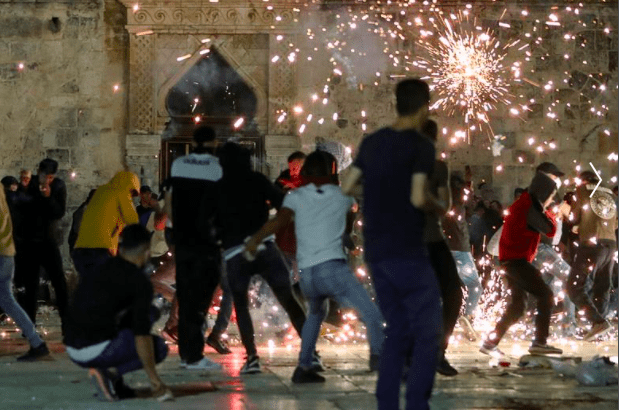Netanyahu, Abbas, Abbas and the ‘TikTok Intifada’
A new cycle of deadly violence paralyzes democracy in both Israel and Palestine.

Palestinian youth clash with Israeli police at Al Aqsa Mosque, May 7, 2021/Reuters
Lisa Van Dusen
May 11, 2021
As the longest-serving prime minister in Israel’s history and the man whose siege of the country’s democracy has compelled four elections in two years that have kept him in power and out of jail, Benjamin Netanyahu is an easy culprit to peg for the current escalation of Middle East violence.
As it happens, Netanyahu’s role in this latest eruption of deadly Israeli-Palestinian belligerence has two accessories, both named Abbas: Palestinian Authority President Mahmoud Abbas, whose continued rule benefits the Likud leader by maintaining a longstanding bilateral deadlock; and Mansour Abbas (no relation), leader of Israel’s United Arab List or Ra’am party, who has suspended negotiations on a new governing Knesset coalition that would replace the entrenched prime minister, keeping Netanyahu in his role as master of Israel’s security narrative.
On April 29, the Palestinian Abbas postponed indefinitely the May 22 (parliamentary) and July 31 (presidential) elections — the first Palestinian elections since the 2006 vote that elected Hamas in Gaza and gave democracy a bad name — citing possible Israeli restrictions on Palestinian voting in East Jerusalem. On Monday, the Arab-Israeli Abbas postponed his party’s negotiations with Yamina leader Naftali Bennett and Yesh Atid leader Yair Lapid, saying he would not negotiate until the violence stops. Those decisions have, for the moment, added otherwise unfathomable tenth political lives to the nine that Benjamin Netanyahu and Mahmoud Abbas have already logged.
The recent violence was catalyzed, per Haaretz, on April 12, when Israeli police erected barriers at the Damascus Gate to the Arab quarter of Jerusalem’s Old City, where young Palestinians (locally known as Arab-Israelis) congregate at the beginning of Ramadan. The tensions of that incident were exacerbated by a series of video drops of clashes between Arab and Israeli youth in Jerusalem in what has been called the “TikTok intifada”. This week, the spiral was further fuelled by Sunday’s delay of a Supreme Court decision on the expropriation of several Palestinian families in the East Jerusalem neighbourhood of Sheikh Jarrah to make way for Jewish settlers.
The timing of this worst escalation of the conflict since 2014, coming as it does in the early days of a US administration not likely to maintain its predecessor’s Kushnerian approach to the Middle East peace process, has effectively paralyzed democracy on both sides of the separation wall.
This spectacular conflagration of flashpoints has produced the worst violence in years, including Monday’s Israeli Defense Forces raid on the sacred Al Aqsa Mosque — which shares the most hypersensitive 36 acres on Earth with the sacred Jewish sites of the Temple Mount and Western Wall — that made the 2000 Ariel Sharon walkabout that provoked the second intifada look neighbourly, followed by hundreds of Hamas rockets raining down on Jerusalem and Tel Aviv. At press time, the exchange of Hamas rockets and Israeli airstrikes on targets in Gaza — including a strike that rubbled a 13-story building said to house the offices of key Hamas officials — has produced 53 Palestinian casualties and six deaths in Israel.
The timing of this worst escalation of the conflict since 2014, coming as it does in the early days of a US administration not likely to maintain its predecessor’s Kushnerian approach to the Middle East peace process, has effectively paralyzed democracy on both sides of the separation wall.
That paralysis seals, for the moment, a bilateral status quo that benefits players on both sides to whom uncorrupted, unimpeded democracy represents an existential power threat. Unless, of course, one of them chooses to transform that status quo by making things worse instead of better for the Israeli and Palestinian people whose destinies are so intertwined.
Lisa Van Dusen is associate editor of Policy Magazine. She was Washington columnist for the Ottawa Citizen and Sun Media, international writer for Peter Jennings at ABC News, and an editor at AP National in New York and UPI in Washington. She was also communications director for the McGill Middle East Program in Civil Society and Peace Building (now ICAN).
